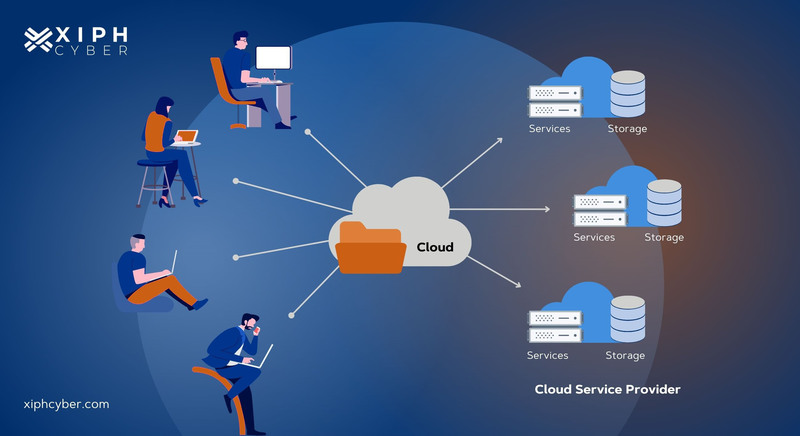LinkDaddy Universal Cloud Storage: The Ultimate Service Introduction
LinkDaddy Universal Cloud Storage: The Ultimate Service Introduction
Blog Article
Transform Your IT Framework With Universal Cloud Solutions
In today's swiftly advancing electronic landscape, the change towards universal cloud services has actually come to be a strategic crucial for companies looking to enhance their IT infrastructure. By discovering the nuanced methods in which global cloud solutions can be customized and integrated, organizations can truly open their complete possibility in achieving digital transformation and competitive benefit in the market.
Benefits of Universal Cloud Provider
Welcoming universal cloud services provides companies a myriad of benefits that enhance operations and improve scalability in today's vibrant digital landscape. One key advantage is cost-efficiency, as cloud services eliminate the requirement for ahead of time financial investments in hardware and facilities. This pay-as-you-go model permits companies to range sources up or down based upon their needs, optimizing spending and reducing general IT prices. Furthermore, cloud solutions supply versatility and accessibility, making it possible for workers to accessibility information and applications from anywhere with a net connection. This not only improves cooperation and efficiency yet also supports remote work arrangements, which have actually come to be significantly common in the modern-day company world.
Moreover, universal cloud services use enhanced safety and security procedures, with data encryption, regular backups, and integrated disaster healing mechanisms. This guarantees that business-critical information is shielded from possible dangers and breaches. Cloud solutions enable automated updates and maintenance, lowering the worry on inner IT groups and guaranteeing that systems are always current and running smoothly. Generally, embracing universal cloud solutions can bring about boosted performance, agility, and competitiveness for companies in today's digital age.
Migration to Cloud Infrastructure
Companies progressively identify the calculated imperative of transitioning their IT facilities to cloud-based solutions. Migrating to cloud framework offers various benefits, including scalability, cost-efficiency, and raised agility. One of the primary factors business select cloud migration is the ability to range resources up or down based upon rising and fall needs, guaranteeing optimal efficiency without overprovisioning. Furthermore, cloud services get rid of the demand for significant upfront investments in physical equipment, lowering capital investment and permitting companies to pay just for the sources they use.
Another benefit of moving to cloud infrastructure is the enhanced dexterity it offers. Cloud systems use rapid implementation of applications and solutions, allowing services to adjust swiftly to market modifications and stay ahead of competitors. In addition, the cloud promotes remote accessibility to information and applications, promoting collaboration among geographically dispersed groups.
Enhancing Information Safety Actions
One essential aspect of enhancing data safety and security is executing multi-factor authentication (MFA) to include an additional layer of protection beyond passwords. MFA needs customers to supply two or even more confirmation aspects, such as a password and an one-of-a-kind code sent to their smart phone, before accessing delicate data. This dramatically lowers the threat of unauthorized access, even if passwords are endangered.
Additionally, organizations need to on a regular basis conduct protection audits and vulnerability analyses to identify and attend to potential weak points in their data safety framework - universal cloud storage Service. By remaining aggressive and continuously improving information safety and security actions, companies can successfully reduce threats and safeguard their important info properties in a progressively electronic globe
Implementing Cloud-Based Applications
In adjusting to modern technical advancements, organizations are increasingly leveraging cloud-based applications to enhance their procedures and boost efficiency. Cloud-based applications offer a range of benefits, including scalability, flexibility, and cost-effectiveness. By carrying out cloud-based applications, services can improve procedures, enhance partnership among groups, and boost general performance.
In addition, implementing cloud-based applications can lead to much better data management and security. These applications typically have built-in protection features and use data file encryption to safeguard delicate information.
Optimizing Cost-Efficiency
To accomplish ideal cost-efficiency in leveraging cloud-based applications, organizations need to purposefully evaluate their resource allocation and application. One essential strategy for maximizing cost-efficiency is to adopt a pay-as-you-go version, where organizations just pay for the resources and solutions they utilize. This flexibility enables for cost savings by getting rid of the demand to spend in costly infrastructure that might not be totally made use of.

Routine surveillance and optimization of cloud resources are vital for recognizing locations where cost-savings can be achieved. By evaluating use patterns and performance metrics, organizations can make enlightened decisions about source allowance and more enhance their procedures to maximize cost-efficiency in the cloud.
Conclusion
To conclude, universal cloud solutions supply many benefits such as cost-efficiency, best site adaptability, improved protection procedures, and automated updates. Moving to shadow facilities enables organizations to utilize cost-efficiency, scalability, and agility to stay competitive. Implementing robust data security measures and cloud-based applications additional boost information protection and drive innovation. Making best use of cost-efficiency with pay-as-you-go versions, automated resource scaling, and optimization strategies ensures ideal usage of cloud resources and general price savings.
Furthermore, cloud services offer adaptability and accessibility, enabling employees to access information and applications from anywhere with a web connection.In addition, global cloud services supply enhanced safety and security actions, with data encryption, routine backups, and integrated catastrophe healing systems. Cloud systems provide fast release of applications and services, useful source enabling companies to adapt quickly to market changes and stay in advance of rivals. Additionally, the cloud assists in remote accessibility to information and applications, promoting cooperation amongst geographically distributed teams.
In final thought, universal cloud solutions use countless benefits such as cost-efficiency, flexibility, improved protection actions, and automated updates.
Report this page